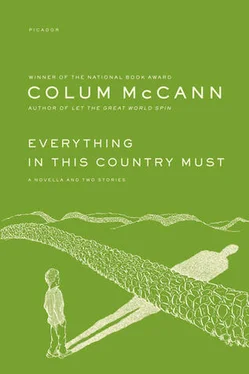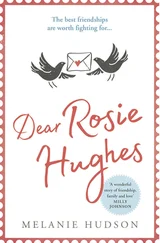He began to jog along the beach, looking over his shoulder at her, turning at the far seawall, climbing the steps and circling around once more. He thought about trying to phone his grandmother, but his mother had always done the dialing and he didn’t know the number.
A fresh breeze herded litter along the street and he walked past the alleyway where the older teenagers were breathing in their glue. They called after him and he hurried away, giving them two fingers from beneath his jacket.
Try me, he said under his breath.
You’d try me, would you?
Come on, so.
I’ll kick the living shite out of ye.
He found himself suddenly outside the house of the old couple. It was a whitewashed bungalow and there were roses in bloom on the front driveway. It looked old, as if it had been sunk back into another decade, battered by years of the sea. The window frames were rotted. Some slates were missing from the roof. The gate, when he touched it, shivered. He hesitated and then opened the latch and turned around again. He went to the pier, sat with his back to a pierside bollard and smoked a cigarette, then raised the courage and walked nervously up the path. The old man answered the door.
Can I borrow the kayak?
Excuse me?
If I keep it close to shore?
The old man smiled and said: Wait please.
The boy was surprised that the man had a foreign accent. He couldn’t place it and, for a moment, he was horrified that the old man might be English, but the accent didn’t have any of those tones. English people, he thought, delivered their words on silver tongs. They spoke as if each word were being served with scones and china cups. Or else they spoke like soldiers, rolling the words around with menace and fear. This accent was different. It sounded like there was gravel in it. Like there were stones in the old man’s larynx.
The old man shuffled out from behind the house carrying a life jacket with him and he beckoned the boy to come around the corner where the kayak was propped against the wall. The boy knew from watching that he would have to carry the kayak high above his head, and the old man nodded approval at the way he balanced the paddles on either shoulder. They negotiated their way through the rosebushes.
It’s light, said the boy, although the boat was much heavier than he expected.
They went toward the sea and the man looked like he was walking toward days that once had been.
At the pier it took them a long time to adjust the spray skirt that would stop water from coming into the boat, and then the man passed forward the single life jacket and told the boy to strap it on.
The boy looked toward the beach at the blond girl in her swimsuit and felt a flush of embarrassment in his cheeks.
I don’t need a life jacket.
Put it on.
Why?
The old man smiled, and with that the boy strapped on the jacket.
I can swim you know.
I didn’t ask you if you could or not.
Fair enough, said the boy.
It was high tide and there was no need to drop the boat with ropes. They let it rest on the water and the old man climbed down a couple of rungs and went into it with skill. He said that dropping the boat from the pier was dangerous. It was really just the lazy man’s way out, he didn’t like carrying the boat all the way around to the beach. The boy was shocked at how difficult it was to get in — the old man gripped his arm and guided him down, but still he was sure he was about to fall. He could feel the sweat at his armpits and he was suddenly happy for the life jacket. He put his hands in the water and it felt remarkably cold.
The old man asked him if he was ready, but before the boy could answer the boat was already gliding out into the water.
The sun lit up half the harbor and the rest was left in cloud shadow.
They said very little as they paddled around near the pier. The boy, at the front of the kayak, couldn’t see the old man’s face and he wondered if he was bored. The boat seemed fragile; the boy felt as if he was sitting on the very surface of the water and the nervousness made his fingers tremble. The paddle was hard to maneuver and, even in the calm waters of the harbor, he felt sure the kayak would tumble. They paddled farther out than any of the swimmers, and he felt as if the whole beach was watching them. His head felt light and airy and he had to fight the happiness. The old man showed him how to slice the paddle through the air, turning it in midswing so that it cut sideways, smooth and controlled. He said that all good things were done with economy. The blade should never go too deep into the water or else too much energy would be used. And there should never be too much of a splash when the paddle came out — it should look as if the sea had hardly been disturbed.
Don’t fight the water, the old man said. Let the sea do the work.
The boy tried to place his accent, still uncertain, but after a while he grew comfortable with the paddling and asked where the old man was from.
Lithuania, he said.
Lithuania?
Do you know where that is?
I do, aye.
But the boy knew nothing of Lithuania, and when he finally admitted it they stopped by a buoy, steadied themselves, and the boy half turned his body around in the kayak. The old man drew a map of the USSR on the buoy with a wet finger, the borders gradually dissolving in the heat. There were large liver spots on the man’s hand and the boy thought he could have made the map from them. The man said that he had once been a logger in pine forests near the Polish border, that he had been away from his country for over thirty years now, living in different parts of Europe, surviving on money from a relative in New York.
The boy felt dizzy in the vast geography that was contained in the harbor.
He learned that afternoon how to ply the paddle with a gentle twist so that the blade struck the water fully, how to curve the boat with a flick of his wrist. His arms grew tired and his knees ached from where they were bent in the well of the boat. When they pulled in to the pier the old man slapped him on the shoulder, said: You did well. Come back tomorrow. You’ll learn more.
The boy ran home.
His mother was waiting for him and in the early evening, after dinner, she told him about his uncle, the reports that had come through on the pierside phone, and he imagined it: the pulse weakening, the feel colder, the taste of water metallic, the headaches, the dizziness, then the searing agony settling down to its own dullness, the eyes more shrunken every day, a dip in the blood pressure, a dribble cup at his head, bile on the pillow.
He’ll go to the end, his mother said.
He’ll die?
He’ll go to the end, she said again.
Does he still have a cough?
He does, yeah.
And do they give him medicine?
No, there’s sugars or proteins or something in the medicine, he can’t take it.
Do they still keep food at his bed?
They do, yeah.
They’re bastards, he said.
She hesitated at the curse, a reply quivering on her lips, but she said nothing. Afterward she went down on her knees to pray.
Bastards, he whispered again before he went to sleep. He heard the muffled weeping from where she knelt.
* * *
THE OLD MAN was waiting for him on the low wall outside the house, rolling a cigarette with patience, sprinkling the tobacco evenly on the paper. The bones on the back of his hands were prominent, leading like a scallop to his fingers. He brought the cigarette to his lips and licked the paper and sealed it slowly. The boy had his own cigarette butts in his pocket that he had rescued from his mother’s ashtray but he didn’t want to light up in front of the old man. He watched with jealousy as the cigarette crisped and flared. Two thin streams of smoke came from the old man’s nostrils and the boy leaned closer to get the smell of the tobacco.
Читать дальше












